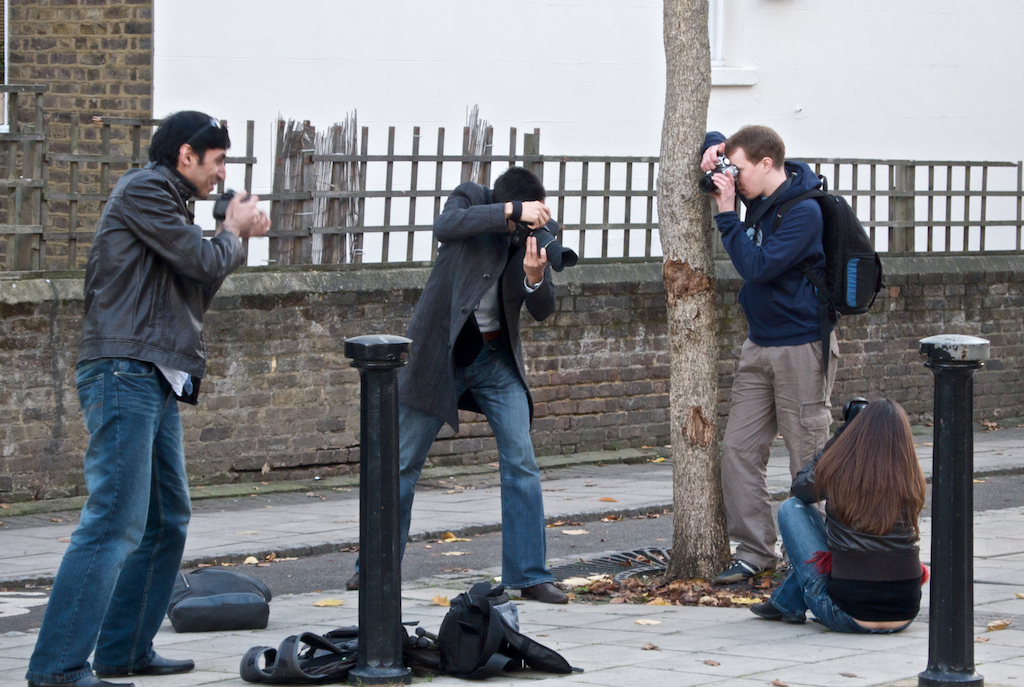It seems these days everyone wants to make films. Throw a rock in a Starbucks and chances are you’ll hit someone writing a screenplay. Throw it hard enough and it’ll be one less to worry about. Y outube has shown us the budding filmmaker in almost everyone. Michael Winterbottom’s film A Day in the Life, which consisted of compiled footage from people all over the world on a single day, demonstrated how widespread filming has become. Not that quantity always translates into quality. A quick trawl through the internet confirms that talent is not always apparent. But why does everyone want to do it? What’s driving the desire? It can’t just be to look cool and shout at people, can it? Not that looking cool and shouting at people isn’t enjoyable, of course, but there has to be more to it than that.
Maybe we should look at the “how” first. The answer, quite simply, is digitization. Back in the day, before the world turned digital, if you wanted to make a film you needed lots of people and lots of cash. I made my first short film in 1997. A one day shoot; a full crew. Cost: £5000.00. (Fortunately it was paid for by a production company who had optioned a screenplay I had written otherwise it wouldn’t have happened at all.) It sounds like a lot but that was actually a very reasonable budget for a 10 minute film shot on film (the processing alone was a couple of grand!). W e blagged favours for all the post-production costs (edit, telecine, sound etc.) otherwise it would have cost another £5000. There were about 30 people working on set when we filmed and to this day, I’m still not sure what a lot of them actually did. But in those days there was no other option. And then it all changed. Digital cameras and editing software became affordable and available and suddenly you could go and make a film for next to nothing and have everything you need without having to mount a massive operation at great expense. Sadly the film production company who had my script collapsed under the weight of the owner’s coke habit but I didn’t need anyone anymore … I could do it all myself, so I went off and shot a feature length film on a budget of 200 quid – just because I could.
Digitization brought freedom … and the death of the middle man. The middle man could be anyone that had the key to the cash that would ultimately fund your project. It could be a commissioning editor, a producer, a stupidly rich individual … whoever it was, you would have to get through them before you could get to anyone else. All power resided with them. And if you didn’t have an “in” you were very unlikely to even be able to get them to read your script, let alone get a meeting with them. As W oody Allen put it so perfectly: “Show business is not dog-eat-dog, it’s dog-doesn’t-return-other-dog’s-phone-calls.” The middle man is dead. Long live the creator! Ok, so he’s not quite dead. I know, he is still there and still commanding all the power at the top end of film production, but there is now a booming industry in self-generated films. The advance in camera technology, with machines such as the Canon 5d now available, have allowed filmmakers to go off and shoot cinema-worthy productions on micro budgets without needing the “green light” from a ‘suit’ .
Making up statistics as I go along, let’s assume that for every 1000 scripts written maybe one would be optioned, and for every 1000 scripts optioned maybe one would get made, and for every 1000 films made maybe one would find distribution. I know I have just plucked those figures from thin air, but you get the idea – the chances of anyone seeing your work was slim, at best. And yet now, with a simple click, you can upload your work to be seen by potentially billions.
I like the democracy of the internet. If a film is really good it will get passed around. If it isn’t, it won’t. Simple. Y outube and other web based platforms have allowed filmmakers access to viewing audiences that dwarf most TV and cinema box office figures. The only difference being that, no matter how successful your film is, the chances of you making any money from it are practically zero. But then you have to ask yourself: what you are doing it for in the first place? And so we come back to the “why” . What are you hoping to gain from it? If you want financial reward, the film industry probably isn’t the place to look for it. Y ou’re facing lottery odds. But if you want to produce films and get them to an audience without it costing you an arm and a leg, your time has come. Although I do have a suspicion that a lot of the drive comes from a desire for fame (everyone loves movies and wanting to be a part of that glamour is incredibly appealing in our celeb-led times)
I’d like to think that it’s ultimately about the need to express oneself. In the W erner Herzog film Cave of Forgotten Dreams they uncovered incredible 50,000-year-old cave paintings – a discovery that ably demonstrates how the creative urge has been in man from the very beginning. But I also think the “why” might stem from the fact that we are all seeing the world through different eyes and we feel the need to replicate our own perception in the hope that it will match others. It is a desire to connect … and not to feel so alone in our life experience. If you’re looking for a stint in the spotlight and the adoration of the public you’re probably making films for the wrong reasons. If fame and fortune are the be all and end all for you, go fuck a footballer.
And somewhere among all of this is me. Why am I doing it? What can I say? I feel the need. Do my delusions and desires fit into all the above categories? Most definitely. Do I have a better chance of “making it” than any of the other millions all trying to do the same thing? Probably not. However, I did recently come to the conclusion that the thing I had spent most of my adult life trying to become, I kind of already was. I just hadn’t really realised it. I am still making films and in the immortal words of the Dark Knight:“It’s what you do that defines you.”
Now, get me a skinny soy latte and get a fucking move on!
(This article features in the first ever edition of the magazine “Smack” and is on sale in Rococo’s in Notting Hill and also available on subscription. Please email info@smackonline.com for more details)



Once again, Jon, you writing is wonderful. Fame and hoping for fortune are perhaps the #1 reason for making a film. The ‘times’ have changed creativity to $$$ with so much access on Youtube, etc. Great blog.